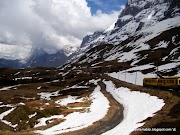Drive a little faster and you might not even notice you passed a whole country between leaving Austria and entering Switzerland: the Principality of Liechtenstein. The sixth smallest independent country in the world is strange on many levels: its ruling family originates from Austria, its currency is the Swiss Franc and it uses the tune of God Save the Queen with German lyrics as its national anthem.
Ha az ember kicsit gyorsabban hajt, talán észre sem veszi, hogy Ausztria és Svájc között egy egész országon halad keresztül, amelynek neve Liechtenstein Hercegség. A világ hatodik legkisebb független állama több szempontból is fura hely: az uralkodó család osztrák, a pénz svájci, a himnusz pedig a God Save the Queen dallama német szöveggel.
Had it not been for the political ambitions of the Liechtenstein family back in the 17th century, this country would probably not exist now. Not possessing any territory, the Liechtensteins were not eligible for membership in the national assembly (Reichstag) of the Holy Roman Empire at the time, so they purchased some land and created a principality in 1719. At only 160 sq.km, I actually photographed almost the entire country when I took the photo below of the capital Vaduz. :)
Ha a Liechtenstein-háznak nem lettek volna politikai ambíciói a 17.század vége táján, ez az ország ma jó eséllyel nem is létezne. A Német-római Birodalom akkori szabályai alapján földbirtok nélkül nem válhatott senki a parlament (Reichstag) tagjává, így Liechtensteinék vettek maguknak némi földet, majd 1719-ben alapítottak egy hercegséget. Az ország területe mindössze 160 km2, így az alábbi fotón nem csupán a fővárost, hanem majdnem az egész országot sikerült lefényképeznem. :)
It took the Liechtenstein family more than a century to actually visit the country they purchased, but they did move in eventually and have resided in the Castle of Vaduz ever since. The princely family is protected by one guard only and the country does not even have a permanent army.
Bő évszázad eltelt, mire a Liechtenstein család tagjai rászánták magukat, hogy egyáltalán ellátogassanak az általuk megvásárolt országba. Végül aztán csak beköltöztek és azóta is a vaduzi kastély a hivatalos hercegi rezidencia. A hercegi családot mindössze egy őr védi, az országnak pedig nincs állandó hadserege.
Liechtenstein is very small and very rich. People probably don't worry much about money here, but they did have to sacrifice the Alpine village-like character of the tiny capital: low taxes attracted many international companies, fuelling a construction of boom of ugly concrete office blocks. Since the Castle is not open to the public and the main street is lined with the ugly office buildings mentioned before, the only touristy thing one can do is to walk along the pedestrianized Städtle, which does retain some charm.
Liechtenstein nagyon kicsi és nagyon gazdag. Az itteni emberek valószínűleg ritkán aggódnak a pénz miatt, a fővárosuk alpesi és falusias hangulatát azonban kénytelenek voltak feláldozni: az alacsony adók rengeteg külföldi céget vonzottak ide, amelyek aztán ronda betonkockákat emeltek a város közepén. Miután a kastély nem látogatható, a főutcát pedig az imént említett ronda irodaépületek uralják, egyedül a Städtle nevű sétálóutcán lehet kicsit turistáskodni.
 |
| Vaduz: Städtle |
 |
| Even the street clock is a Rolex... Még az utcai óra is Rolex... |
Stamps and coins issued by tiny countries are highly sought after by collectors. Liechtenstein does not have its own currency but the Liechtensteinische Post is well prepared: in addition to the several philatelic shops, downtown Vaduz even has an automated postal machine.
Az apró országok által kiadott érmék és bélyegek mindig nagyon keresettek a gyűjtők körében. Bár az országnak nincs saját pénzneme, a Liechtensteinische Post jól felkészült: Vaduz főutcáján a számos bélyegüzleten túl még egy postai automatát is elhelyeztek.

While Liechtenstein is quite conservative (women were only granted the right to vote in 1984), this is not reflected in the building that has housed the 25-member Parliament since 2008: built entirely of ocher-colored bricks (with matching paving stones around it), it feels modern, minimalistic and elegant at the same time.
Bár Liechtenstein konzervatív ország (a nők csak 1984-ben kaptak szavazati jogot), a huszonöt tagú Parlamentnek 2008 óta helyet adó épület nem ezt tükrözi: a kizárólag okkersárga téglákból álló építmény (körülötte azonos színű térburkolattal) egyszerre modern, minimalista és elegáns.








